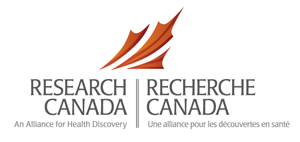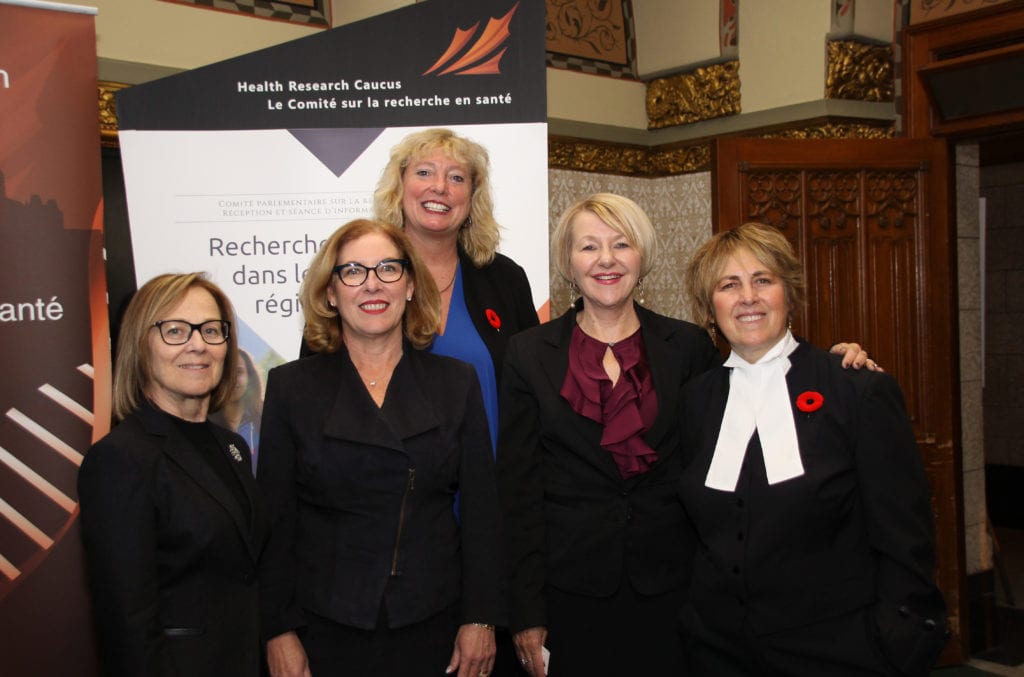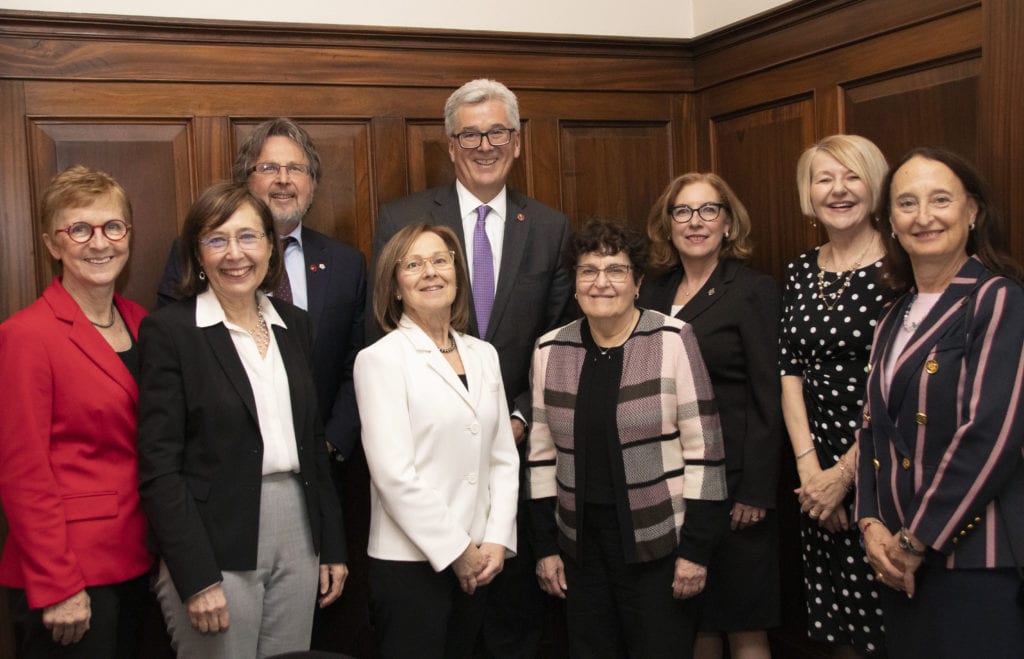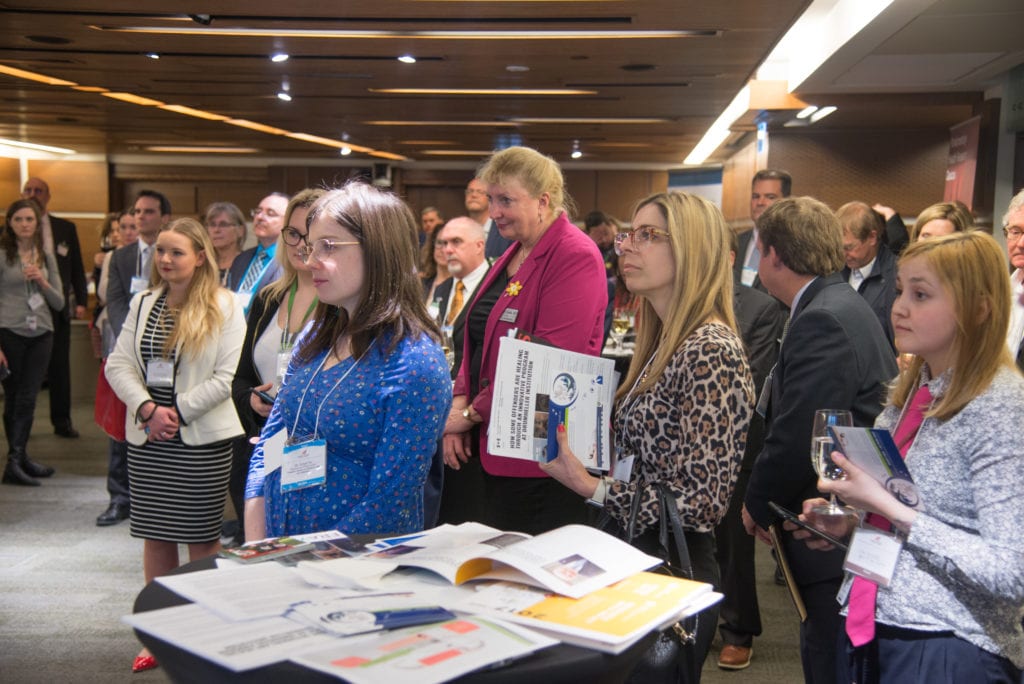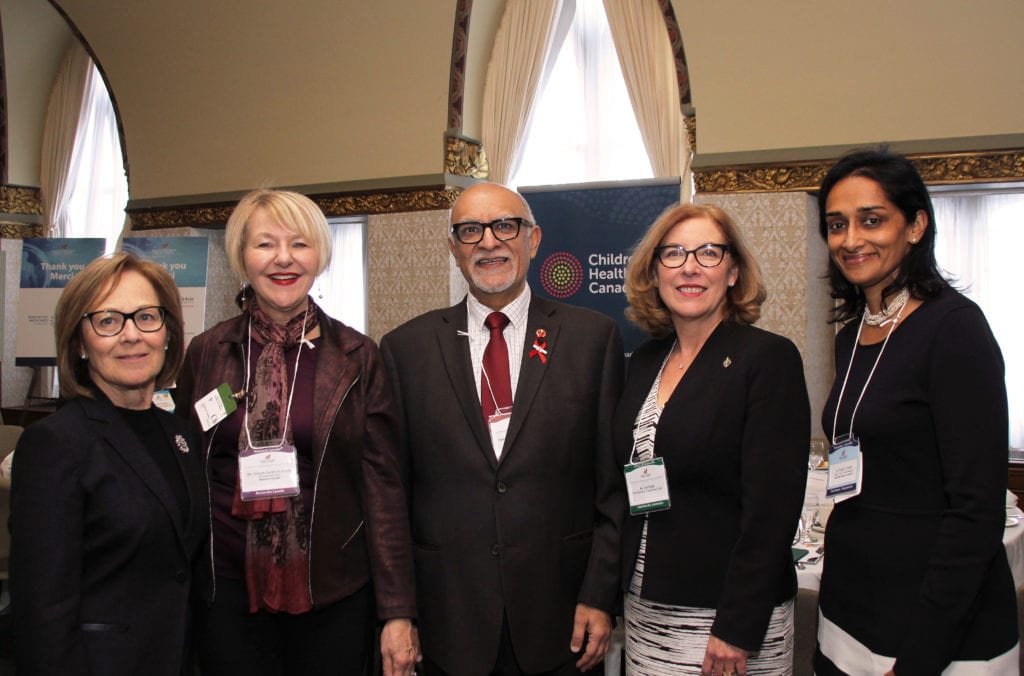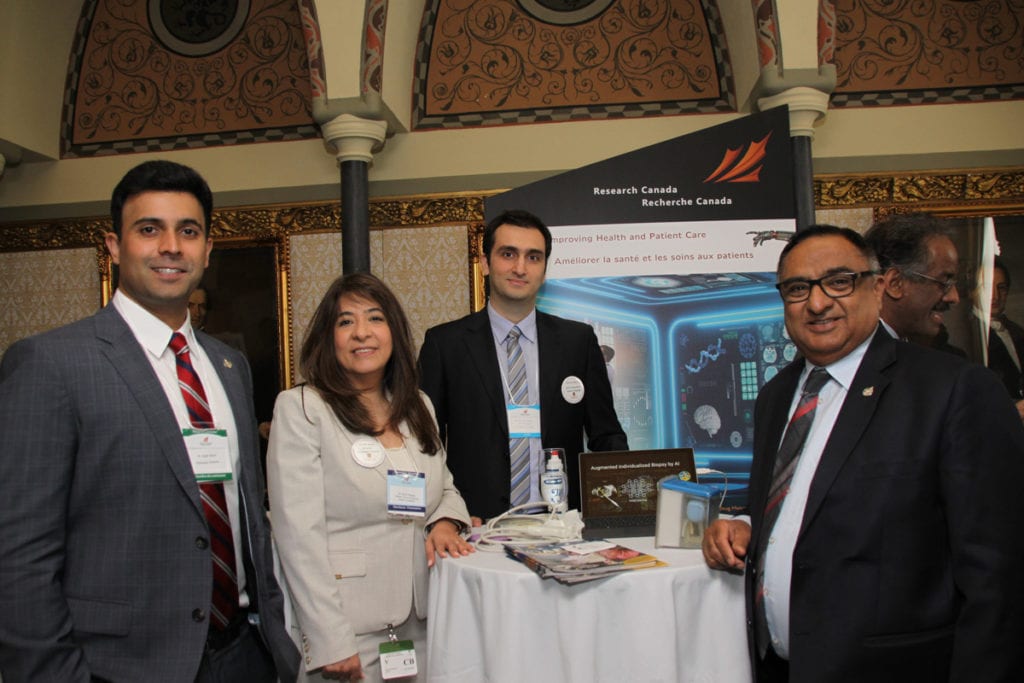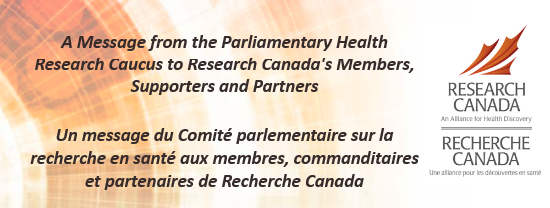The Parliamentary Health Research Caucus

The Parliamentary Health Research Caucus
Created in 2009 by Senator Wilbert Keon and Research Canada, the Parliamentary Health Research Caucus is a non-partisan, “owned by Parliamentarians” forum that engages all Parliamentarians in luncheon and reception events organized by Research Canada. Caucus events showcase Canadian health research and health innovation, raising awareness among elected officials about the social and economic benefits derived from the country’s health research and innovation ecosystem.
Over the past decade, more than 250 talented and dedicated health researchers and innovators have shared their stories and scientific achievements with Parliamentarians at over 35 reception and luncheon events on the opioid crisis, Indigenous health, mental health, veterans’ health and pediatric research, just to name a few.
Upcoming Events
- Parliamentary Health Research Caucus Virtual Panel: AFTERNOON TEA AND SPIRITS: Conversation with COVID-19 Testing and Tracing Experts – August 26, 2020
- Parliamentary Health Research Caucus Virtual Panel: A RACE AGAINST THE CLOCK: The Quest for a COVID-19 Vaccine – October 21, 2020
Caucus Members
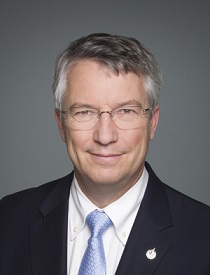
Mr. Lloyd Longfield
MP (Guelph)
Chair
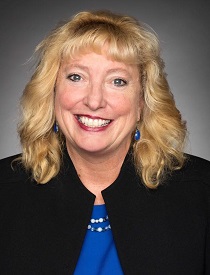
Ms. Marilyn Gladu
MP (Sarnia—Lambton)
Vice Chair
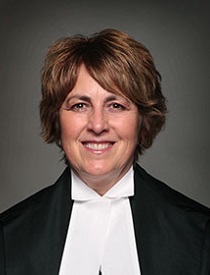
Ms. Carol Hughes
MP (Algoma—Manitoulin—Kapuskasing)
Vice Chair
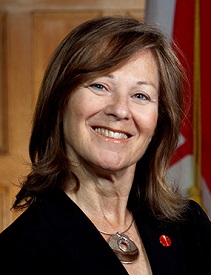
Hon. Judith Seidman
Senator
Senate Representative
Past Presenters
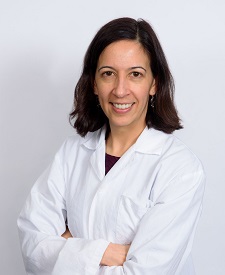
Sofia Ahmed, MD
University of Calgary
Dr. Ahmed is part of a group of researchers at the University of Calgary, Cumming School of Medicine that is looking at the impact of COVID-19 on health care workers across the globe.
This ongoing study will determine how health care workers’ work and personal lives are being affected and how the impact varies depending on factors that include identity and relationships. Ultimately, this will, hopefully, give Dr. Ahmed and her team valuable insights into future pandemic workforce planning.
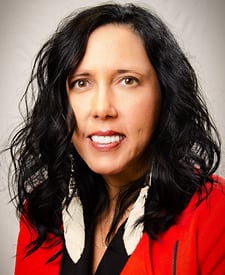 Carrie Bourassa, PhD
Carrie Bourassa, PhD
University of Saskatchewan
Dr. Bourassa is the scientific director of the CIHR Institute of Indigenous Peoples’ Health and a professor in the Department of Community Health and Epidemiology at the University of Saskatchewan.
Dr. Bourassa has been named to the Federal COVID-19 Immunity Task Force. The major two-year initiative—part of a $350-million project to expand national testing and modelling announced April 23 by Prime Minister Justin Trudeau—aims to provide decision-makers with the best science to manage the epidemic and help safely get Canadians back to work.
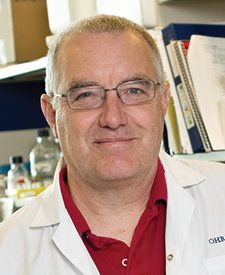 John Bell, PhD
John Bell, PhD
Ottawa Hospital Research Institute
Dr. Bell, Ottawa’s foremost immunotherapy researcher, has turned his attention to developing a vaccine for COVID-19 with the help of a $250,000 “fast grant” from The Thistledown Foundation.
A senior scientist at The Ottawa Hospital, Dr. Bell is one member of a research team that hopes to apply what it has learned from decades of work on cancer-fighting viruses to the development of a COVID-19 vaccine.
 Timothy Caulfield, BSc, LLB, LLM
Timothy Caulfield, BSc, LLB, LLM
University of Alberta
Mr. Caulfield is one of seven U of A researchers to receive funding through the second round of the federal government’s Rapid Research Funding Opportunity, created to aid in the battle against COVID-19.
Over the next few months, Mr. Caulfield and his team will assess how misinformation around COVID-19 spreads through mainstream and social media, and through search engines such as Google.
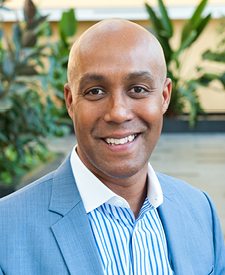
Hance Clarke, MD, PhD
Toronto General Hospital
Dr. Clarke is the Director of Pain Services at the Toronto General Hospital and an Associate Professor at the University of Toronto.
Dr. Clarke has been a powerful voice for the healthcare sector amid the current pandemic. As the co-author of 4 crucial health-care lessons Canada needs to learn from COVID-19, an article for CBC, he outlined some critical frustrations from the health sector and some valuable insights on what needs to be done to prepare for future pandemics.
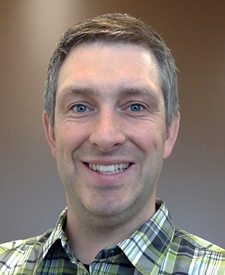
Darryl Falzarano, PhD
VIDO-Intervac
Dr. Falzarano leads a research team at VIDO-InterVac made up of scientists from Dalhousie University, the National Microbiology Laboratory, the National Centre for Foreign Animal Disease, and the University of Manitoba.
One of only a few high-level containment facilities in the world able to conduct research on a vaccine for COVID-19, VIDO Intervac has been working on coronaviruses for 40 years. They were the first in Canada to isolate SARS-CoV-2, the first in Canada to have a vaccine candidate, and the first in Canada to vaccinate animals.
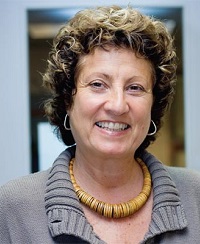 Eleanor Fish, PhD
Eleanor Fish, PhD
University of Toronto
University Health Network
Dr. Fish is a professor in the Department of Immunology at the University of Toronto and a researcher for the University Health Network at the Toronto General Hospital Research Institute.
As a passionate advocate for health research and the initiator of several emerging infectious diseases studies, Dr. Fish has become the senior author of a potential interferon-based COVID-19 treatment. She is evaluating the safety and effectiveness of this treatment and is collaborating on another trial to determine if it can prevent COVID-19 infection in uninfected individuals.
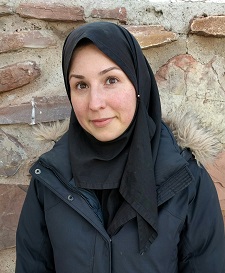 Marzyeh Ghassemi, PhD
Marzyeh Ghassemi, PhD
University of Toronto
Dr. Ghassemi is part of several research teams that have received funding from CIFAR’s AI and COVID-19 Catalyst Grants initiative for artificial intelligence-based research projects aimed at addressing the COVID-19 outbreak, including MyTrace, a privacy-compliant mobile app for contact tracing of COVID-19.
Dr. Ghassemi and her collaborators are using machine learning and app development to conduct the first-of-its-kind AI-enabled mobile app to help clinicians identify and treat COVID-19-associated stress in children and families. This project is also funded through CIFAR’s AI and COVID-19 Catalyst Grant.
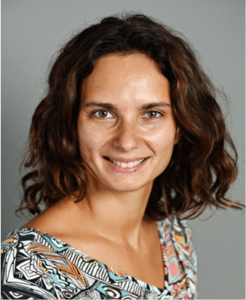
Anna Goldenberg, PhD
Hospital for Sick Children
Dr. Goldenberg is part of a team of clinical and technical experts that have received funding through CIFAR’s AI and COVID-19 Catalyst Grants initiative to develop a unique tool to prevent COVID-19 infections in families.
Dr. Goldenberg’s team’s research could lead to the development of a revolutionary mobile app that would allow health professionals to leverage AI to help them assess stress levels in children and their families associated with COVID-19 and enable them to provide resources and support during this critical time.
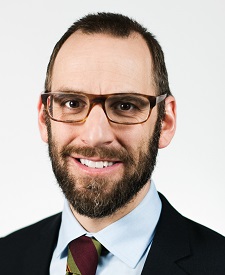
Doug Manuel, MD
Ottawa Hospital Research Institute
As a physician, a senior scientist, and a senior medical advisor to Statistics Canada, Dr. Manuel has used data and artificial intelligence to lead the development of several interactive health calculators.
Recently, Dr. Manuel led a team of researchers to develop a new interactive website that predicts the number of hospitalizations and deaths due to COVID-19 in Ottawa. These scenarios show the impact of physical distancing and will be used to plan resources in the region such as intensive care beds and ventilators.
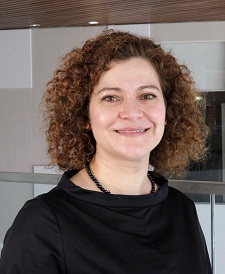 Zena Samaan, PhD
Zena Samaan, PhD
McMaster University
Dr. Samaan is a psychiatrist and suicide researcher at McMaster University who specializes in mood disorders and the comorbidity of depression with medical disorders and addiction.
Dr. Samaan has been putting her research to use during COVID-19 by operating a pilot project that assists individuals that have been hospitalized for suicidal behaviour. By making regular calls to 50 people, her team is fighting depression and loneliness through compassionate human contact.
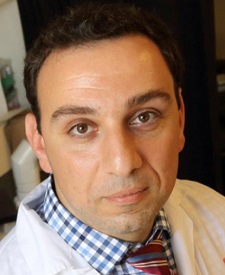
Cédric Yansouni, MD
McGill University Health Centre
Dr. Yansouni is the Associate Director of the J.D. MacLean Centre for Tropical Diseases at the MUHC and focuses his research on the improvement of diagnostic tools and care for infectious diseases in remote and low resource settings.
As an infectious disease specialist, he has been a vocal member of the medical community during the current pandemic. Dr. Yansouni has shared his insights on potential COVID-19 immunity and the lack of evidence that can support claims that recovered patients cannot be reinfected.
